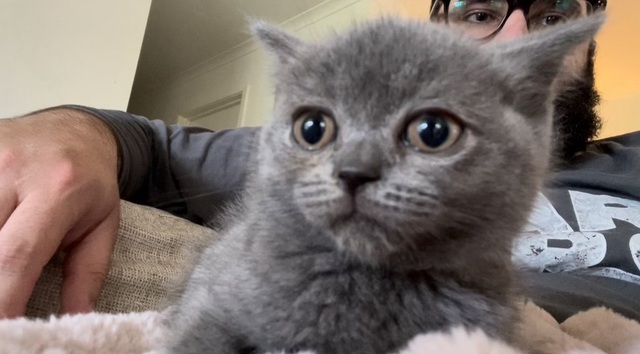A Cranbourne North couple are desperate to bring their pet cat back home fully healthy after he was diagnosed with a viral disease.
Tanya Kamil is distraught after what she thought would be a regular vet check-up with some medication. Instead she was told to take her cat Beyza to Dandenong’s Veterinary Referral Hospital (VRH).
The one-year-old “sweet indoor cat” has been treated at the hospital for feline infectious peritonitis – an immune-system response to feline coronavirus.
He’s not off the hook yet as recovery may take months with ongoing medication.
Beyza returned home from the hospital with a weak immune system, isolated in a room completely disinfected to avoid him falling sick.
“He used to eat three times a day. When he fell sick, he stopped eating. He used to love his food,” Tanya says.
“He’s a simple boy.
“I feel bad for him because he doesn’t cause problems. He’s not strong or the fighter of the group.”
Tanya says she and Beyza bonded when she nursed him back to health during a previous illness.
“We weren’t friends at first but slowly he grew on me. I connected with him when he had his first cat flu.
“I had to take care of him and give him his medicines in the morning a few times a day, put in his eyedrops.
“We liked each other. We were hesitant at first, but we bonded. We used to play with each other.”
The feline coronavirus infects cats worldwide however it mutates within the host becoming virulent and the infection uncontrollable for the immune system.
The infection can affect all organs such as brain, liver, eyes and kidney.
It was once considered to be a death sentence with no successful treatment available until recently, according to a board-certified small animal internal medicine specialist at VRH.
“The treatment of feline infectious peritonitis (“FIP”), a coronavirus that is specific to cats, is a landmark development in veterinary medicine,” Dr Matt Munro said.
“FIP is a serious systemic infection that can occur in any cat but is more commonly seen in younger patients.
“Until recently, there was no successful treatment available for FIP and this disease was invariably fatal for all cats.
“With the explosion anti-viral drug discovery in human medicine, veterinarians have been able to adopt treatment with medications such as remdesivir, GS-441524, and molnupiravir.”
According to him, recent studies show up to 80 per cent of cats can be successfully cured in what is considered a “major breakthrough for veterinary science.”
Some cats however can relapse but Dr Munro says options remain to continue to successfully treat the patients.
“Treatment is typically carried out over several months and generally consists of daily oral medication. Research continues to optimise treatment protocols and treatment success.”
Tanya has so far used almost $4000 of savings on Beyza’s hospital stays, medicines and tests.
She has organised a GoFundMe page to help cover Beyza’s present and future medical needs, which amount to $10,000 or more, depending on his recovery.
She doesn’t have any insurance to cover the costs and is also on a hunt for a work-from-home job.
“I should at least spend $3000-4000 for the month because he has internal specialist appointments and his medicines. It’ll be a lot.
“If I had the money I wouldn’t hesitate, it wouldn’t matter to me.”
She fears Beyza may stop receiving the treatments due to financial strain and desperately welcomes any help on her page.
Beyza’s GoFundMe page can be accessed at gofund.me/701c0039


















